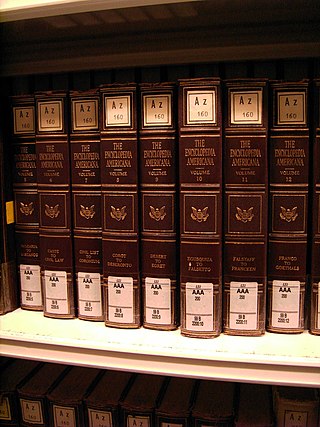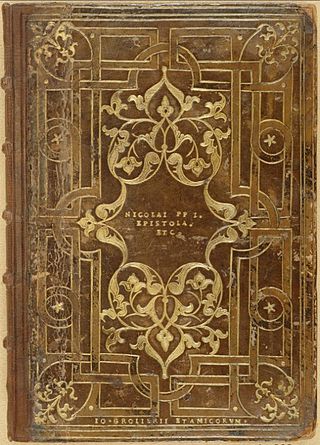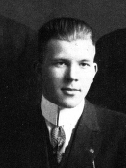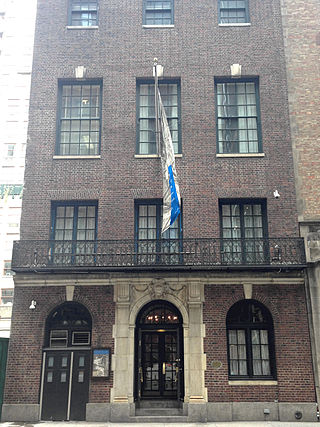
Encyclopedia Americana is a general encyclopedia written in American English. It was the first general encyclopedia of any magnitude to be published in North America. With Collier's Encyclopedia and Encyclopædia Britannica, Encyclopedia Americana became one of the three major and large English-language general encyclopedias; the three were sometimes collectively called "the ABCs of encyclopedias". Following the acquisition of Grolier in 2000, the encyclopedia has been produced by Scholastic.

Book collecting is the collecting of books, including seeking, locating, acquiring, organizing, cataloging, displaying, storing, and maintaining whatever books are of interest to a given collector. The love of books is bibliophilia, and someone who loves to read, admire, and a person who collects books is often called a bibliophile but can also be known as an bibliolater, meaning being overly devoted to books, or a bookman which is another term for a person who has a love of books.

Bibliophilia or bibliophilism is the love of books. A bibliophile or bookworm is an individual who loves and frequently reads or collects books.

Harry Elkins Widener was an American businessman and bibliophile, and a member of the Widener family. His mother built Harvard University's Widener Memorial Library in his memory, after his death on the foundering of the RMS Titanic.

Grolier was one of the largest American publishers of general encyclopedias, including The Book of Knowledge (1910), The New Book of Knowledge (1966), The New Book of Popular Science (1972), Encyclopedia Americana (1945), Academic American Encyclopedia (1980), and numerous incarnations of a CD-ROM encyclopedia (1986–2003).

Jean Grolier de Servières, viscount d'Aguisy was Treasurer-General of France and a famous bibliophile. As a book collector, Grolier is known in particular for his patronage of the Aldine Press, and his love of richly decorated bookbindings.

Frederick Baldwin Adams Jr. was an American bibliophile and the director of the Pierpont Morgan Library in New York City from 1948 to 1969.

Josiah Kirby "Joe" Lilly Jr. was a businessman and industrialist who served as president and chairman of the board (1953–66) of Eli Lilly and Company, the pharmaceutical firm his grandfather, Colonel Eli Lilly, founded in Indianapolis in 1876. Lilly, the younger son and namesake of Josiah K. Lilly Sr., graduated from the University of Michigan's School of Pharmacy in 1914 where he was a member of the Chi Psi Fraternity. He served in the United States Army in France during World War I.

The Grolier Club is a private club and society of bibliophiles in New York City. Founded in January 1884, it is the oldest existing bibliophilic club in North America. The club is named after Jean Grolier de Servières, Viscount d'Aguisy, Treasurer General of France, whose library was famous; his motto, "Io. Grolierii et amicorum" [of or belonging to Jean Grolier and his friends], suggested his generosity in sharing books.
The Caxton Club is a private social club and bibliophilic society founded in Chicago in 1895 to promote the book arts and the history of the book. To further its goals, the club holds monthly dinner meetings and luncheons, sponsors bibliophile events and exhibitions, and publishes books, exhibition catalogs, and a monthly journal, The Caxtonian. The Caxton Club is a member club of the Fellowship of American Bibliophilic Societies.

The Maya Codex of Mexico (MCM) is a Maya screenfold codex manuscript of a pre-Columbian type. Long known as the Grolier Codex or Sáenz Codex, in 2018 it was officially renamed the Códice Maya de México (CMM) by the National Institute of Anthropology and History of Mexico. It is one of only four known extant Maya codices, and the only one that still resides in the Americas.
The Hroswitha Club was a membership-based club of women bibliophiles and collectors based in New York City, active from 1944 to 2004.
Sarah Gildersleeve Fife was a prominent force among women bibliophiles in the first half of the 20th century and a leader in gardening and horticulture, advocating the use of plantings around army bases and military hospitals.
John Tracy Winterich (1891–1970) was an American writer and journalist.

The Book Club of Detroit, is a private club and society of bibliophiles in downtown Detroit, Michigan. Founded in 1957, The Book Club of Detroit, is a club for book collectors.
Henrietta Collins Bartlett was an American bibliographer, Shakespeare scholar, and creator of the first modern census of Shakespeare's published drama. She has been called "one of the foremost bibliographers of her time," despite working in a scholarly field in which "the overwhelming majority has been male."
The Fellowship of American Bibliophilic Societies (FABS) is an association of American book clubs whose members seek interaction with book collectors across the country and around the world. At The Rowfant (Book) Club's 100th anniversary celebration in 1992, local members and their guests from book clubs in New York, Chicago, Philadelphia, and San Francisco discovered common interests in bibliophilic book clubs. The new association's first meeting was November 5, 1993, in New York, at The Grolier Club. In 1994, the group drew up articles of association outlining their goals to promote and develop common interests of the member societies.
As of 2018, several firms in the United States rank among the world's biggest publishers of books in terms of revenue: Cengage Learning, HarperCollins, Houghton Mifflin Harcourt, McGraw-Hill Education, Scholastic, Simon & Schuster, and Wiley.
Ruth S. Granniss was an American librarian, known for her longtime position as Librarian of the Grolier Club, which she held from 1906 to 1944.
Thomas Kimball Brooker is a bibliophile, scholar and businessman.










